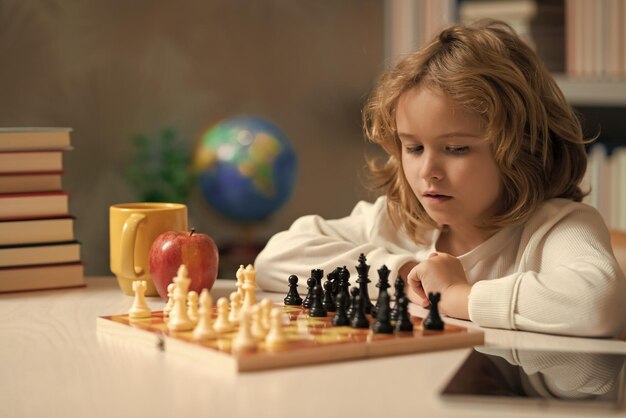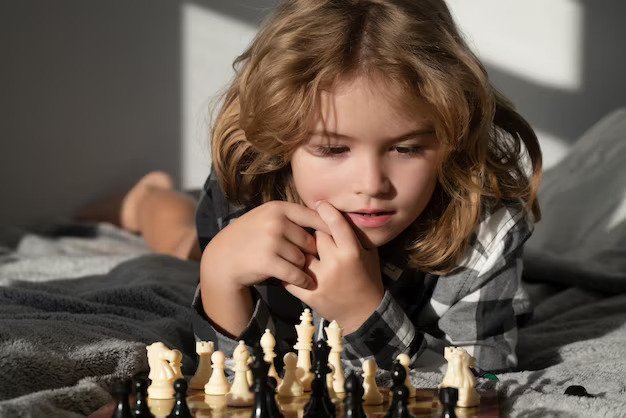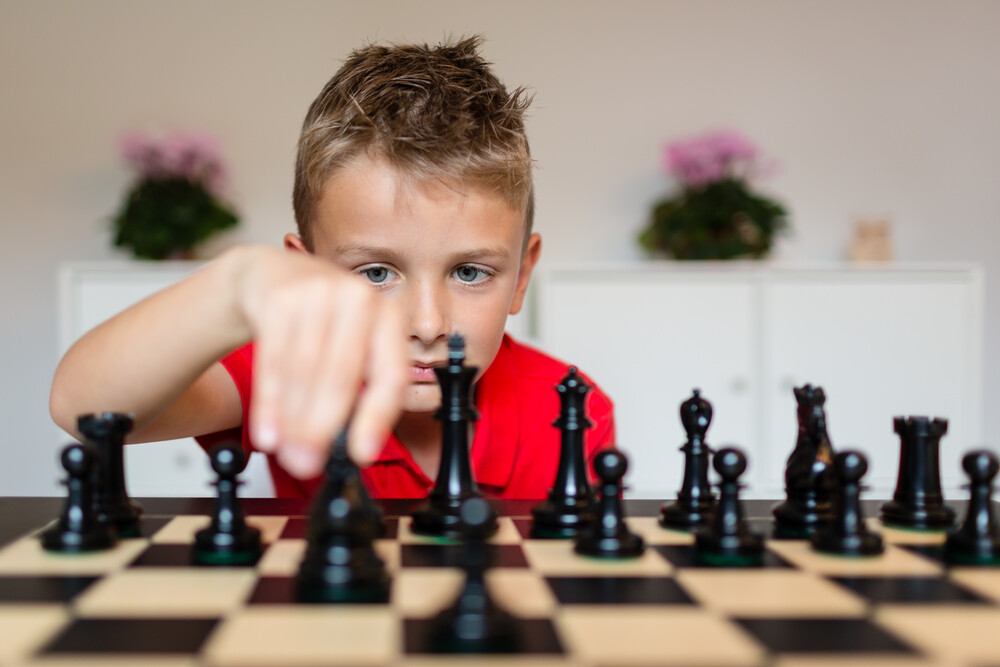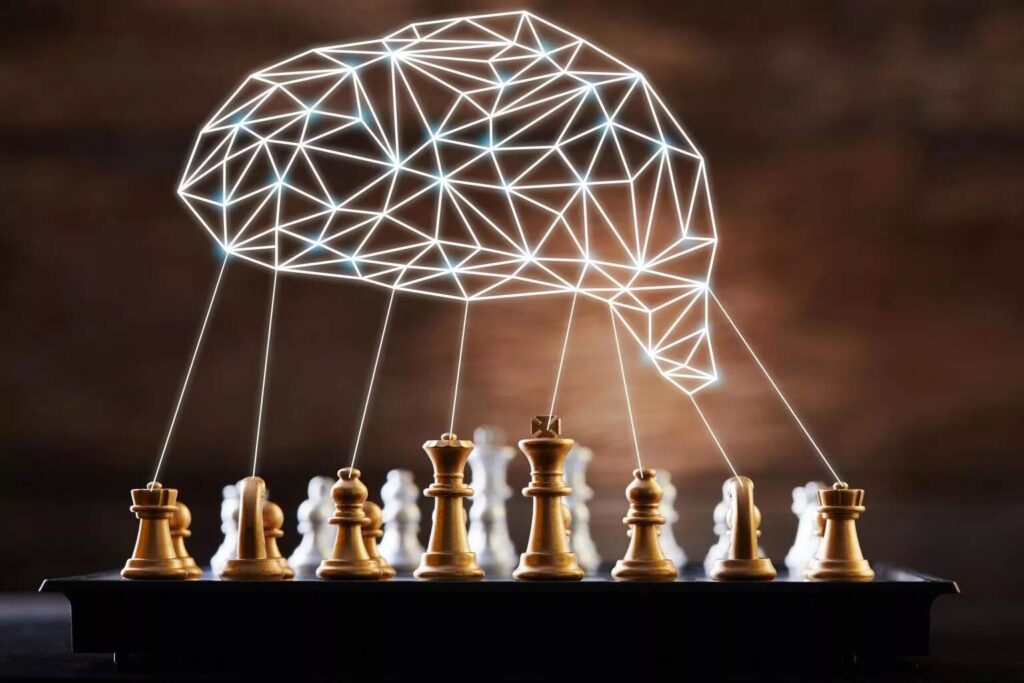Chess has long been known as a game of deep strategy and intense focus. But beyond the moves on the board, there’s something much more profound happening in the brain. Chess engages both hemispheres of the brain, helping to develop cognitive abilities such as memory, focus, problem-solving, and critical thinking. More than just a pastime, chess offers real, measurable benefits for brain development—benefits that are supported by neuroscience.
How Chess Stimulates Both Hemispheres of the Brain
The human brain is divided into two hemispheres—the left and right. Each hemisphere is responsible for different types of thinking.
The left side of the brain is generally linked to logic, analysis, and reasoning, while the right side handles creativity, spatial awareness, and intuition. Chess is unique because it activates both sides of the brain, helping to create a balanced mental workout.
Left Brain: Logical Thinking and Calculation
When you play chess, you engage in logical thinking and analysis. You calculate possible moves, weigh risks, and plan several steps ahead.
These types of thought processes are primarily handled by the left hemisphere of the brain. Players are constantly thinking about strategies, trying to determine the best possible move based on the current position of the pieces.
This type of thinking requires deep concentration and logical analysis.
For example, when deciding whether to sacrifice a piece for a better position, players need to think several moves ahead.
They must calculate the potential responses from their opponent and consider the consequences of their decisions. This calculation sharpens logical reasoning, helping players make smarter decisions not just in the game, but in everyday life as well.
Right Brain: Creativity and Visualization
While the left side of the brain focuses on logic and strategy, the right side of the brain engages in creative thinking and visualization.
Chess is a highly visual game—you need to picture how the board will look several moves ahead, imagine different possibilities, and anticipate your opponent’s tactics. This visualization exercise strengthens the right hemisphere of the brain, which is responsible for spatial awareness and creative problem-solving.
Chess encourages players to think outside the box. It’s not always about following the standard moves—you need to come up with creative strategies to outmaneuver your opponent.
Whether it’s visualizing complex positions or spotting opportunities that aren’t immediately obvious, chess activates the brain’s creative side, helping players become more innovative thinkers.
Enhancing Memory and Cognitive Flexibility
One of the standout benefits of playing chess is its ability to improve memory. Chess players need to remember previous games, positions, and strategies, as well as keep track of what has happened during the current game.
This constant mental exercise strengthens both short-term and long-term memory, which is a critical part of cognitive development.
Strengthening Short-Term Memory
In a typical chess game, players must constantly remember where all the pieces are, what moves they’ve made, and what moves their opponent has made.
This continuous need to recall information from earlier in the game strengthens short-term memory. Short-term memory is vital for everyday tasks like following directions, doing math in your head, or even just remembering where you placed your keys.
Chess players also develop what is known as “chunking”—the ability to group pieces and patterns into mental chunks of information. Instead of remembering each piece individually, players remember entire formations or tactical sequences.
This is a powerful cognitive skill that helps the brain process and store more information efficiently, which is useful for tasks requiring quick thinking and fast information retrieval.
Boosting Long-Term Memory
In addition to improving short-term memory, chess also enhances long-term memory. Experienced players rely on stored knowledge of past games, opening strategies, and specific endgame techniques.
Over time, chess players build a mental database of patterns, strategies, and game outcomes. This ability to store and retrieve information quickly strengthens long-term memory, helping players recall relevant strategies during critical moments in a game.
This enhancement of long-term memory goes beyond chess. The skills developed through memorizing chess strategies can be applied to studying for exams, learning new subjects, or mastering any skill that requires storing and recalling complex information over time.
Cognitive Flexibility and Adaptation
Chess requires players to adapt quickly to changing situations. In every game, the position of the pieces on the board is constantly evolving.
A strategy that worked a few moves ago may no longer be viable, and players must adjust their plans accordingly. This need for cognitive flexibility—being able to switch between different strategies and thought processes—helps players develop mental adaptability.
Cognitive flexibility is a critical component of problem-solving and creative thinking. In life, situations change, problems arise, and solutions that worked in the past may no longer be relevant.
Chess teaches players to think on their feet, remain open to new possibilities, and shift gears when necessary. These skills are essential for navigating complex situations, both on and off the board.
Improving Focus and Attention Span

In today’s world, attention spans are getting shorter, with distractions like smartphones and constant notifications making it difficult for many people—especially children—to stay focused for long periods.
Chess is one of the best tools for building concentration and focus, as it demands sustained mental engagement over the course of a game. Whether playing a casual game or a high-stakes match, chess requires players to remain attentive, analyze the board, and think critically for the entire duration.
Sustained Concentration
Chess games often last 30 minutes to an hour or more, depending on the format. During that time, players are required to keep their attention fully on the game, thinking deeply about their moves and their opponent’s potential strategies.
Every decision matters, and one moment of lost focus can result in a costly mistake. This kind of sustained concentration, practiced regularly, helps players extend their attention span and build mental endurance.
For kids, learning to concentrate for longer periods of time is crucial. Chess provides them with a structured way to practice staying focused, which can benefit them in school and other activities that require long-term attention.
Children who play chess tend to have better focus during lessons, are less likely to get distracted, and are better at completing tasks that require ongoing mental effort.
Blocking Out Distractions
Chess players also develop the ability to block out distractions—whether it’s background noise, time pressure, or an opponent’s mind games. When players learn to focus solely on the chessboard, they’re training their brain to filter out irrelevant information and focus on the task at hand.
This skill becomes increasingly valuable in today’s multitasking world, where distractions are constant, and the ability to filter them out is essential for productivity.
For example, in a chess tournament, players might face distractions such as other players talking, the ticking of a clock, or the stress of knowing they’re running out of time.
Chess teaches players how to stay calm and concentrated in these moments, allowing them to make rational decisions without being affected by external pressures. This skill can be translated into everyday life, helping children and adults alike to stay focused during exams, work projects, or personal challenges.
Enhancing Executive Function
Executive function refers to the brain’s ability to manage tasks, organize thoughts, and make decisions. Playing chess engages and improves executive function by requiring players to plan, organize their moves, manage time, and make decisions based on the situation at hand.
Whether deciding to attack or defend, players must prioritize tasks, think ahead, and execute a plan based on the best available information.
This sharpening of executive function can benefit children and adults in many ways. In school, children with stronger executive function skills are better able to complete tasks, manage homework, and organize their time effectively.
Adults who regularly play chess may find themselves better at managing work projects, meeting deadlines, and making informed decisions in complex situations.
Chess and Emotional Regulation: Managing Stress and Building Resilience

While chess is often seen as a game of logic and strategy, it also plays a crucial role in emotional development. Chess challenges players to manage their emotions, deal with stress, and remain calm under pressure.
These emotional regulation skills are essential not only for succeeding in chess but also for handling life’s many challenges.
Learning to Stay Calm Under Pressure
Chess often puts players in high-pressure situations where they must make important decisions with limited time. For example, in a timed chess match, the clock is ticking, and players must think quickly while still making the best moves possible.
This need to think critically under pressure teaches players to remain calm and focused even in stressful situations.
In real life, the ability to stay calm under pressure is invaluable. Whether it’s managing a big project at work, preparing for exams, or dealing with personal challenges, people who are emotionally steady are more likely to succeed.
Chess trains the brain to manage stress, helping players avoid making rash decisions and teaching them to think clearly even when the stakes are high.
Managing Frustration and Dealing with Loss
In chess, losses are inevitable—even the best players lose games. Dealing with loss is one of the most important emotional lessons that chess teaches.
Players quickly learn that losses aren’t failures but opportunities for growth. After losing a game, players often review their mistakes, learning from what went wrong and finding ways to improve in the future.
This mindset encourages a growth-oriented attitude, where setbacks are seen as part of the learning process rather than a reason to give up.
For children, learning to handle frustration and loss is key to building resilience. Chess provides a structured environment where they can practice dealing with disappointment in a healthy way.

Instead of being discouraged by a loss, chess encourages kids to analyze their mistakes and try again. This emotional resilience is critical not only in chess but also in other areas of life, such as school, sports, and personal relationships.
Developing Patience and Emotional Control
Patience is another skill that chess helps develop. Chess is a slow game, requiring players to think carefully before making a move.
Children learn that rushing into decisions can lead to mistakes, and that sometimes, waiting for the right moment is the best strategy. This ability to control impulses and wait for the right opportunity helps strengthen emotional regulation.
In addition to patience, chess players develop emotional control. Whether they’re winning or losing, players must maintain focus and avoid letting emotions influence their decisions.
A player who gets frustrated after a bad move is more likely to make additional mistakes, while a calm player can recover and refocus on the game. Over time, this practice of managing emotions during a game strengthens emotional regulation skills that are useful in everyday life.
Boosting Problem-Solving Skills Through Chess

Chess is a game where every move counts. It’s a constant exercise in problem-solving, as players must evaluate multiple possibilities, weigh risks, and choose the best path forward.
This mental exercise builds a child’s or adult’s ability to think critically and solve problems both on the chessboard and in everyday life.
Analytical Thinking and Decision-Making
One of the key benefits of playing chess is the way it sharpens analytical thinking. Players must break down complex situations, identify threats, and find solutions.
They constantly evaluate their options—whether to attack, defend, or trade pieces—and must make decisions based on a variety of factors. This is a great way to develop strong decision-making skills, as players learn to balance short-term risks with long-term rewards.
For example, a player might sacrifice a piece to gain a better position later in the game. This requires not only understanding the immediate effects of the move but also predicting how the game will develop several moves ahead.
This kind of strategic thinking teaches players to be patient and think through the consequences of their decisions, a skill that is useful in solving real-world problems, whether it’s at school, work, or in personal situations.
Evaluating Multiple Possibilities
Chess is unique in that it encourages players to think about several possible outcomes before making a decision. Unlike games where decisions are based on instinct or immediate reactions, chess demands careful consideration.
Players must anticipate their opponent’s moves while planning their own. This ability to evaluate multiple possibilities strengthens problem-solving skills, as players learn to think critically about different scenarios.
This ability to explore multiple outcomes is particularly useful in academic and professional settings.
Whether solving a math problem, writing an essay, or tackling a work project, being able to think through different options helps individuals make better, more informed decisions.
Enhancing Creative Problem-Solving
While chess is often associated with logic and strategy, it’s also a deeply creative game. Sometimes the best moves aren’t the most obvious ones.
Creative problem-solving comes into play when players use unconventional tactics or find solutions that their opponent didn’t anticipate. This type of thinking allows players to come up with new ways to approach familiar problems, fostering innovation and creativity.
For example, instead of following traditional openings or defensive strategies, a player might use an unexpected combination of moves to catch their opponent off guard.
This ability to think creatively is essential for innovation in real-life scenarios, where the best solutions often require thinking outside the box. Chess helps players develop this skill by pushing them to find new ways to solve complex problems.
Chess as a Lifelong Tool for Brain Development
The cognitive and emotional benefits of chess extend far beyond the game itself. Chess is not just a way to pass the time—it’s a powerful tool for building a well-rounded, resilient brain.
From boosting memory and focus to enhancing problem-solving and emotional control, chess offers lifelong benefits for both children and adults. The skills learned on the chessboard transfer directly into academic, professional, and personal aspects of life.

Chess for All Ages
The beauty of chess is that it’s accessible to everyone, regardless of age. Whether a child is just learning the game or an adult is sharpening their skills, chess continuously challenges the brain, keeping it sharp and agile. For children, it helps with academic performance and personal development.
For adults, it acts as a mental workout that helps maintain cognitive health and prevents cognitive decline as they age.
A Brain-Boosting Game for Life
Chess can be a lifelong companion, offering mental challenges and opportunities for growth at every stage of life. As science continues to explore the links between chess and brain development, it’s clear that this ancient game holds modern value.
Whether you’re looking to improve focus, sharpen your memory, or develop better problem-solving skills, chess is an excellent way to keep your brain active and engaged.
At Global School of Chess, we believe in the transformative power of chess. Our tailored programs are designed to help players of all levels improve their game and harness the cognitive benefits that come with regular play.
Ready to start your journey and boost your brain development through chess? Visit Global School of Chess today and unlock your full potential.
Wrapping it up
Chess is far more than just a game—it’s a powerful tool for brain development. By engaging both the logical and creative sides of the brain, chess strengthens cognitive abilities like memory, focus, problem-solving, and emotional control.
Whether for children or adults, the skills learned through chess enhance critical thinking, improve resilience, and promote mental agility throughout life.
At Global School of Chess, we’re dedicated to helping players unlock these mental benefits while mastering the game. Ready to boost your brainpower through chess? Visit Global School of Chess and begin your journey today.
READ NEXT:

